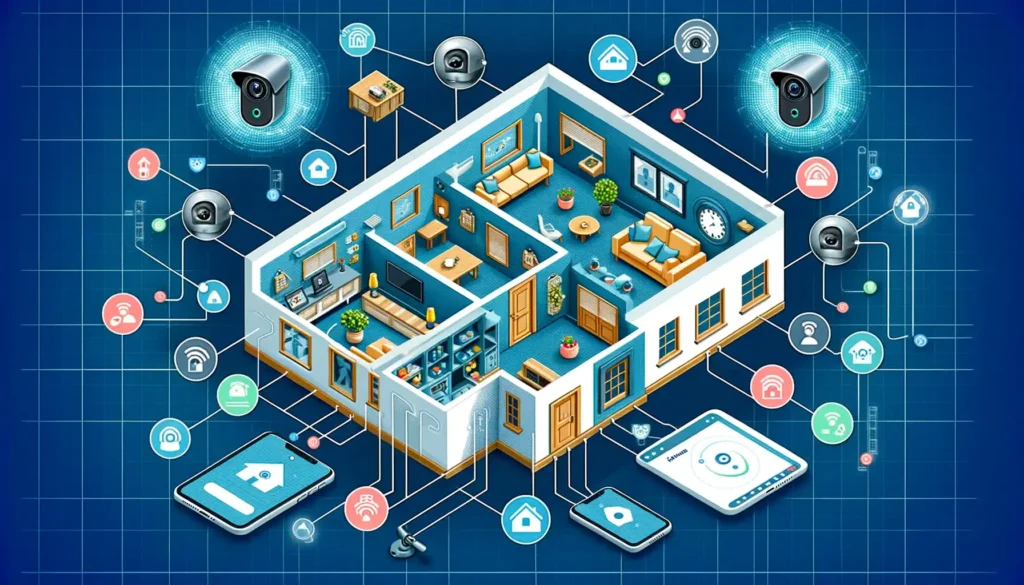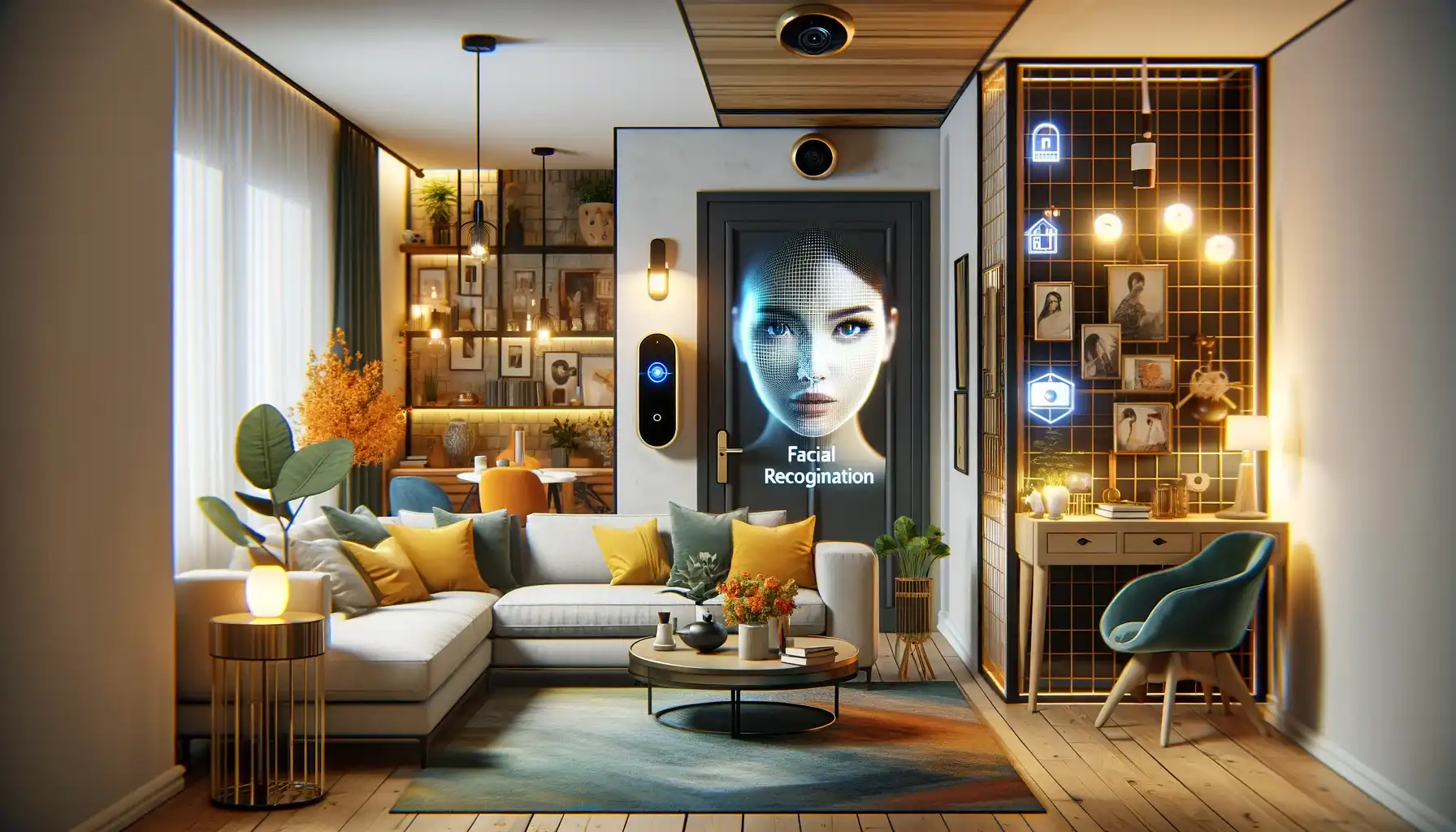The Evolution of AI Smart Home Security
The world of home security is undergoing a major transformation, thanks to the integration of Artificial Intelligence (AI). Gone are the days of traditional alarm systems and basic cameras.
Now, AI Smart Home Security systems are setting a new standard, offering smarter, more personalized protection for your home.
Let’s dive into how AI is changing the game in home security, making it more intuitive, responsive, and user-friendly.
Key Takeaways:
- AI Enhances Traditional Security: AI technologies are evolving from simple alarm systems to advanced, intelligent systems that offer personalized security solutions.
- Beyond Facial Recognition: While AI is often associated with facial recognition, its role in home security extends to various innovative applications, such as smart locks and AI-powered night vision cameras.
- Predictive and Responsive: AI in home security is not just reactive but also predictive, capable of anticipating potential threats based on learned patterns.
AI has revolutionized the concept of smart homes, taking automation to a whole new level. Here’s a brief overview of how AI integrates into smart home technology:
- Personalized Experience: AI systems in smart homes can learn from your habits and preferences. Whether it’s setting the perfect room temperature or adjusting lighting based on the time of day, AI makes your home uniquely yours.
- Predictive Intelligence: These systems are not just reactive but predictive. They can anticipate your needs based on your routine, making life more convenient.
- Seamless Control: With AI, controlling your smart home becomes effortless. Voice commands, gestures, or a simple app can manage everything from security systems to entertainment units.
AI Innovations in Home Security
| Feature | Description |
|---|---|
| Learning Patterns | AI systems learn and adapt to your daily routines, enhancing security by detecting unusual activities. |
| Voice Recognition | Utilizing natural language processing, AI enables you to control your security system through voice commands. |
| Facial Recognition | AI can identify individuals, differentiating between family members and potential intruders. |
| Video Analytics | Continuously monitors your home, using AI to identify and alert you to unusual activities. |
| Predictive Analysis | AI anticipates potential security risks and suggests proactive measures to enhance safety. |
This evolution from manual controls to AI-driven smart homes marks a significant shift in how we interact with our living spaces.
It’s no longer about simple automated tasks; it’s about creating a living space that’s intuitive, adaptive, and responsive to our needs.
The future of home security is not just about deterring intruders; it’s about creating an environment that understands and caters to your lifestyle.
Advanced Features of AI Smart Home Security
The integration of Artificial Intelligence (AI) in smart home security systems brings a suite of advanced features that elevate home safety to new heights.
These features not only enhance security but also add convenience and personalization to your home environment.
Personalized Security and Learning Patterns
One of the most fascinating aspects of AI in home security is its ability to learn and adapt to your daily routines. AI-powered systems can detect unusual activities in your home, alerting you to potential security threats.
This personalization means your home security system understands your lifestyle and adapts to it, offering a more effective and efficient way to keep your home safe.
- Adaptive Learning: AI systems recognize your patterns and preferences, tailoring the home environment to your needs.
- Anomaly Detection: Unusual activities, like movements during odd hours, trigger alerts, providing timely warnings.
Voice Recognition and Natural Language Processing
Voice Recognition: A standout feature of modern AI home security systems is voice recognition, powered by natural language processing.
This technology allows you to control your security system using voice commands, making it more accessible and user-friendly.
- Simple Commands: Say “Arm the security system,” and the AI system will obey, reducing the need for manual control.
- Enhanced Accuracy: Advanced voice recognition minimizes false alarms by distinguishing between actual commands and background noise.
Facial Recognition for Enhanced Safety
Facial recognition technology in AI security systems offers a layer of security that is both advanced and personalized.
- Identity Verification: The system identifies family members, visitors, and intruders, adjusting security measures accordingly.
- Customized Responses: Imagine your home disarming the security system and turning on lights as it recognizes your face, creating a personalized welcome experience.
Video Analytics: The Eyes of Your Smart Home
AI-powered video analytics continuously monitors your home, providing real-time insights into activities around your property.
- Continuous Monitoring: Analyzes security footage for unusual activities, offering real-time alerts.
- Daily Insights: Keeps you informed about everyday events, from your pet’s antics to your kids’ activities.

Predictive Analysis for Proactive Security
Predictive analysis in AI security systems not only reacts to threats but also anticipates them, offering a proactive approach to home security.
- Risk Anticipation: AI can foresee potential security risks and suggests actions to prevent them.
- Maintenance Alerts: Notifies you of maintenance needs, like a failing camera or low battery, ensuring optimal performance.
Integration with Other Smart Home Devices
AI-powered smart home security systems work seamlessly with other smart devices, creating a unified and intelligent home environment.
- Device Communication: For example, if facial recognition identifies a family member, the system could instruct the smart lock to unlock the door.
- Automated Responses: Detecting unusual activity can trigger smart lights or alarms, enhancing security measures.
For a deeper dive into how AI is transforming our living spaces with advanced technology, personalized comfort, and enhanced security, read about AI Smart Home Innovations: Exploring the Next Generation of Home Automation on our site.
Consumer Expectations and Market Trends in AI Smart Home Security
As AI Smart Home Security systems become more advanced, consumer expectations and market trends are rapidly evolving.
Understanding these trends is crucial for anyone beginning their journey into AI smart home security, as it provides insight into what features and innovations are shaping the future of home safety.
Growing Demand for AI-Powered Security
The demand for AI-powered home security systems is on a significant rise.
With their advanced capabilities, these systems are not just about deterring intruders; they’re about offering a seamless, integrated experience that caters to the modern homeowner’s lifestyle.
- Market Growth: The market for smart home security cameras is expected to reach USD 30.38 billion by 2030.
- Consumer Preferences: Homeowners are increasingly favoring systems that offer real-time alerts, motion detection, and sophisticated analytics.
Cloud-based and Edge AI Technologies
AI home security systems leverage both cloud-based and edge AI technologies, each with its unique advantages.
- Cloud AI: Involves processing data in remote locations, allowing for extensive data analysis and storage.
- Edge AI: Occurs on the hardware itself, offering faster response times and reduced reliance on internet connectivity.
| Feature | Cloud AI | Edge AI |
| Processing Location | Data is processed in the cloud. | Data is processed at the device level. |
| Latency | Higher latency due to data transmission time. | Lower latency due to local processing. |
| Data Privacy | Potential privacy concerns due to data transmission and storage in the cloud. | Enhanced data privacy due to local processing and storage. |
| Cost | Lower upfront costs, but ongoing cloud computing costs. | Higher upfront costs, but lower long-term costs. |
| Scalability | Highly scalable to accommodate increasing data and workloads. | Scalability limited by device hardware and processing power. |
| Suitability for Home Security | Suitable for applications that require centralized control and analysis of large amounts of data. | Suitable for applications that require real-time response and low latency. |
Anticipating Future Advancements
As technology advances, so do the possibilities in AI Smart Home Security.
Future developments are likely to focus on:
- Improved Integration: Enhanced compatibility with a wider range of smart home devices.
- Advanced Analytics: More sophisticated data analysis for predictive security measures.
- User-friendly Interfaces: Easier to use systems, making advanced security accessible to everyone.
Additional Considerations in AI Smart Home Security
When delving into the world of AI Smart Home Security, it’s crucial to consider various factors that influence the effectiveness and suitability of these systems for your home.
Here, we explore key considerations and provide insights to help you make informed decisions.
Choosing the Right AI-Powered Security System
Selecting the right AI home security system involves more than just considering the latest features.
It’s about finding a solution that aligns with your lifestyle, security needs, and technical capabilities.
- Compatibility: Ensure the system integrates seamlessly with your existing smart home devices.
- Customization: Look for systems that offer customization options to match your specific security needs.
- Ease of Use: The system should have a user-friendly interface, especially important for those who are not tech-savvy.
Future Outlook of AI in Home Security
The future of AI in home security looks promising, with ongoing innovations aimed at enhancing safety and convenience.
Upcoming trends include:
- Autonomous Security Drones: Drones that patrol your property, offering aerial surveillance and real-time alerts.
- Enhanced Data Privacy: As AI systems collect more data, ensuring robust privacy protections will become increasingly important.
- AI-Assisted Emergency Response: Integration with emergency services for quicker response in case of security breaches.
Parental Guidance in AI Security
For families, understanding how to manage AI security systems is crucial, especially in terms of privacy and safety for children.
- Parental Controls: Utilize systems that offer parental control features for added security and peace of mind.
- Educating Family Members: Teach family members, especially children, about the functionality and safety protocols of the AI security system.
Sustaining AI Security Systems
Maintaining your AI home security system is vital to ensure its longevity and effectiveness.
- Regular Updates: Keep the software updated to protect against new security threats.
- Technical Support: Choose a system with reliable technical support for troubleshooting and maintenance.
Wrapping Up: Embracing the AI Smart Home Security Revolution
As we conclude our exploration into the world of AI Smart Home Security, it’s clear that this technology is not just a fleeting trend, but a transformative shift in how we protect our homes and loved ones. AI’s integration into home security systems offers unprecedented levels of safety, convenience, and personalization, reshaping our approach to home security.
Remember, the journey into AI Smart Home Security is not just about adopting new technology; it’s about embracing a smarter, safer, and more intuitive way of living. Whether you’re looking to upgrade your existing security system or are new to the concept of smart home security, the advancements in AI offer solutions that can cater to diverse needs and preferences.
In this digital era, staying informed and adaptable is key. As AI continues to evolve, it will undoubtedly bring new innovations and possibilities to enhance home security further. By staying abreast of these developments and understanding how they can benefit your home and lifestyle, you’ll be well-prepared to make the most of the AI Smart Home Security revolution.
Thank you for joining us on this insightful journey. Remember, the future of home safety is in your hands, and with AI, it’s smarter, safer, and more personalized than ever before.
Frequently Asked Questions About AI Smart Home Security
Here’s a table of common questions and answers to help you better understand AI Smart Home Security:
| Question | Answer |
|---|---|
| What makes AI Smart Home Security different from traditional security systems? | AI Smart Home Security systems use artificial intelligence to learn and adapt to your lifestyle, offering personalized and proactive security measures, unlike traditional systems which are mostly reactive and have limited capabilities. |
| How does facial recognition in AI security systems enhance home safety? | Facial recognition technology can identify individuals, differentiating between family members, regular visitors, and potential intruders, allowing for tailored security responses based on who is detected. |
| Can AI Smart Home Security systems integrate with other smart home devices? | Yes, these systems can seamlessly integrate with other smart devices in your home, such as smart locks, lights, and thermostats, creating a cohesive and intelligent home environment. |
| Are AI security systems difficult to use for someone who isn’t tech-savvy? | Not necessarily. Many modern AI security systems are designed with user-friendly interfaces, making them accessible and easy to manage, even for those who are not tech-savvy. |
| What should I consider when choosing an AI Smart Home Security system? | Consider factors like compatibility with existing devices, customization options, ease of use, and the level of customer support provided. |
| How do AI Smart Home Security systems protect my privacy? | These systems often come with robust data encryption and privacy settings, ensuring that your personal data and security footage remain secure. However, it’s important to regularly update your system and check the manufacturer’s privacy policy. |
| Can AI Smart Home Security systems predict and prevent potential security threats? | Yes, through predictive analysis, these systems can anticipate potential security risks and suggest proactive measures to prevent them, such as reminding you to lock doors or alerting you to unusual activity. |





